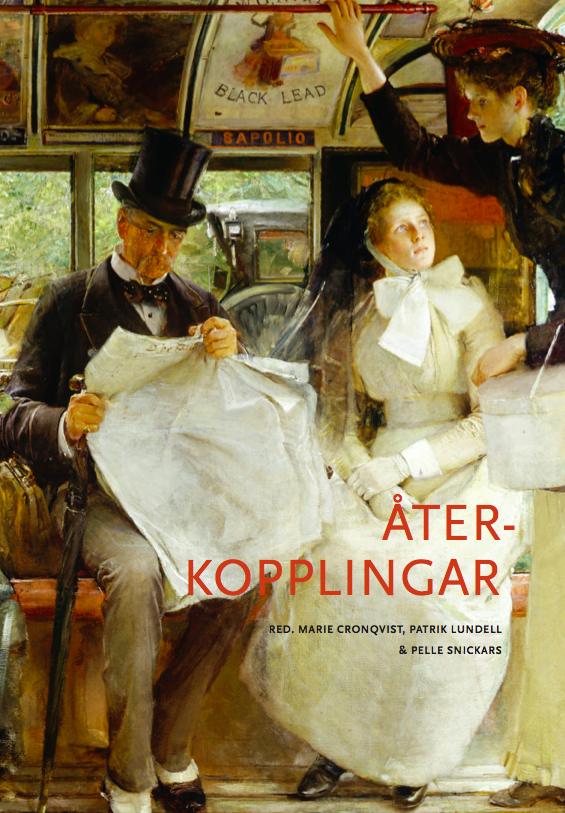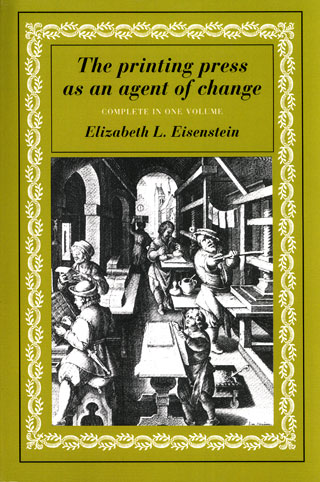Marie Cronqvist, Patrik Lundell, Pelle Snickars (eds.): Återkopplingar (2014) [Swedish]
Filed under book | Tags: · cultural history, media, media archeology, media history, media technology, technology, theory

Återkopplingar [Feedback] is a recent collection on media history and archeology edited by scholars from the universities in Lund and Umeå.
“Det bedrivs alltför lite mediehistorisk forskning i Sverige. Mediehistoria kan – och bör – skrivas på många olika sätt. En ambition inom den kulturhistoriska medieforskning som presenteras i den kommande boken, Återkopplingar, är att genom ett breddat mediebegrepp och historisk sensibilitet uppdatera mediestudiet. Förnyelsen sker inte sällan i skärningspunkten mellan den ofta teknikdeterministiska mediearkeologin och den historiskt lika anspråksfulla som problematiska medialiseringsteorin.
I denna bok presenteras 19 mediehistoriska texter som behandlar medieformer som skrivbord, papper, affischer, kassetter, fisheye linser, radio, telegraf, film, smarta telefoner, litografier, dagstidningar, mikrofilm, begagna de mp3-filer, krigsbyten, biblioteksbyggnader och ölkrus. I boken presenteras en rad samtida perspektiv på förflutna medier – allt i form av en icke-linjär växelverkan mellan nu och då – därav titeln: Återkopplingar.”
Publisher Mediehistorisktarkiv, Lunds universitet, 2014
Mediehistorisk arkiv, 28
Creative Commons BY-NC-ND 3.0 License
ISBN 9789198196122
416 pages
PDF
See also Media archaeology page on Monoskop wiki.
Lisa Gitelman: Paper Knowledge: Toward a Media History of Documents (2014)
Filed under book | Tags: · book, knowledge, media, media history, media studies, media technology, paper, print, technology

“Paper Knowledge is a book about the mundane: the library card, the promissory note, the movie ticket, the PDF (Portable Document Format). It is a media history of the document. Drawing examples from the 1870s, the 1930s, the 1960s, and today, Lisa Gitelman thinks across the media that the document form has come to inhabit over the last 150 years, including letterpress printing, typing and carbon paper, mimeograph, microfilm, offset printing, photocopying, and scanning. Whether examining late nineteenth century commercial, or ‘job’ printing, or the Xerox machine and the role of reproduction in our understanding of the document, Gitelman reveals a keen eye for vernacular uses of technology. She tells nuanced, anecdote-filled stories of the waning of old technologies and the emergence of new. Along the way, she discusses documentary matters such as the relation between twentieth-century technological innovation and the management of paper, and the interdependence of computer programming and documentation. Paper Knowledge is destined to set a new agenda for media studies.”
Publisher Duke University Press, 2014
Sign, Storage, Transmission series
ISBN 0822376768, 9780822376767
210 pages
Interview with the author: Trevor Owens (2014).
Reviews: Jan Baetens (Leonardo, 2014), Alexander von Lünen (2014), Hope Leman (2014), Colin Higgins (Times Higher Education, 2014).
PDF (updated on 2021-4-9)
Comment (0)Elizabeth L. Eisenstein: The Printing Press as an Agent of Change: Communications and Cultural Transformations in Early-Modern Europe (1979)
Filed under book | Tags: · advertising, antiquity, book, cartography, catalogue, censorship, history of science, image, library, literacy, mathematics, media history, memory, philology, print, propaganda, religion, renaissance

“A key text to understand the role of print on social change and the arts. Professor Eisenstein begins by examining the general implications of the shift from script to print, and goes on to examine its part in three of the major movements of early modern times – the Renaissance, the Reformation, and the rise of modern science. Her masterful and well researched text sets a standard for understanding the social impact of printing.”
Publisher Cambridge University Press, 1979
11th printing, 2005
ISBN 052129951, 9780521299558
794 pages
HT Didgebaba
Reviews: Carolyn Marvin (Technology and Culture, 1979), Anthony T. Grafton (Journal of Interdisciplinary History, 1980), Eric J. Freeman (Medical History, 1981), Eric J. Leed (American Journal of Sociology, 1982), Richard Teichgraeber (History of European Ideas, 1984).
PDF (2 vols., 16 MB, updated on 2022-1-30)
EPUB (2nd ed., 2012, added on 2022-1-30)
See also the collection Agent of Change: Print Culture Studies after Elizabeth L. Eisenstein (2007).
Comment (0)
